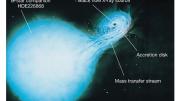The idea that objects exist whose gravity is so powerful that light cannot escape them has been around for centuries. But it was not until instruments aboard a rocket detected x-rays from an unseen source in the constellation Cygnus in 1964 that researchers considered the possibility that they had in fact discovered a black hole, an object from which nothing, including light, can escape. Seven years later, astronomers discovered a star in Cygnus orbiting something that could not be seen. “The dark object’s gravity seemed to be tearing gas from its bright companion,” says author and astronomer Ken Croswell, Ph.D. ’90, “and as the gas took the final plunge [see illustration], it became so hot it emitted x-rays.” But not everyone believed a black hole was the cause; in 1974, Stephen Hawking even bet another physicist that it wasn’t. Now the controversy (which Hawking conceded long ago, based on indirect measurements) has been definitively put to rest by Mark Reid and colleagues at the Harvard-Smithsonian Center for Astrophysics, who were able to calculate an accurate distance to Cygnus X-1, making possible an inference of its mass. Furthermore, they calculated that the gas closest to the dark object orbits it almost 670 times per second—a phenomenal rate that is half the speed of light—clear evidence of an object whose gravitational pull is so strong that it could only be a black hole.
Cygnus black hole confirmed by Harvard-Smithsonian Center for Astrophysics
Cygnus black hole confirmed by Harvard-Smithsonian Center for Astrophysics
Astronomers at the Harvard-Smithsonian Center for Astrophysics confirm the presence of a black hole in the constellation Cygnus.

You might also like
What Bonobos Teach Us About Female Power and Cooperation
A Harvard scientist expands our understanding of our closest living relatives.
Eating for the Holidays, the Planet, and Your Heart
“Sustainable eating,” and healthy recipes you can prepare for the holidays.
Five Questions with Michèle Duguay
A Harvard scholar of music theory on how streaming services have changed the experience of music
Most popular
Explore More From Current Issue

Inside Harvard’s Most Egalitarian School
The Extension School is open to everyone. Expect to work—hard.

The Enterprise Research Campus in Allston Nears Completion
A hotel, restaurants, and other retail establishments are open or on the way.






